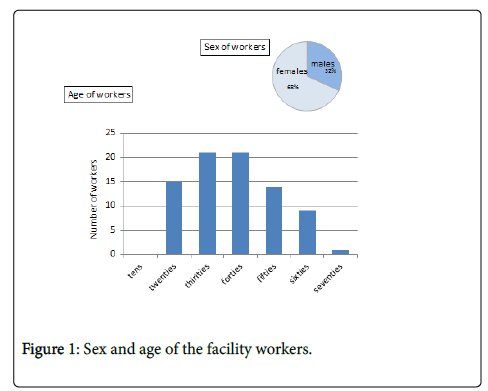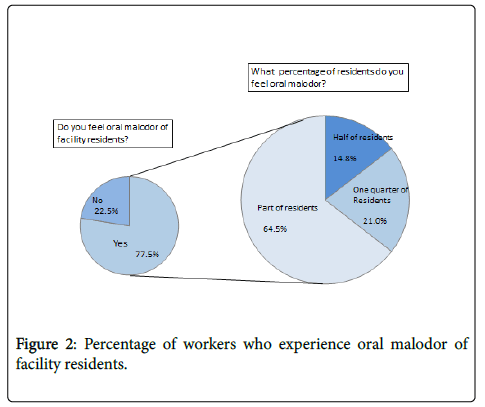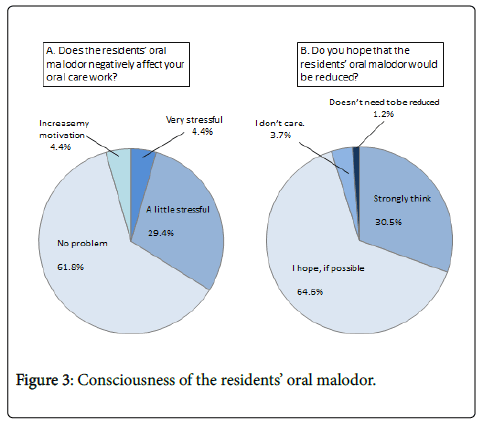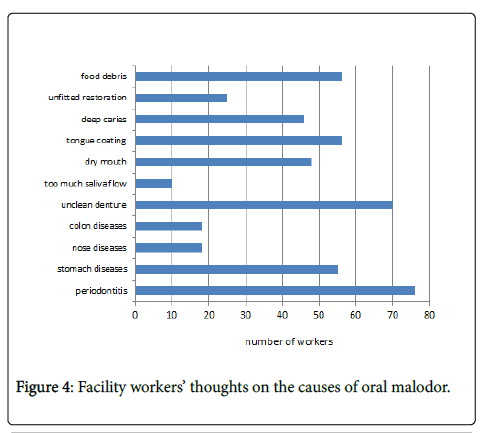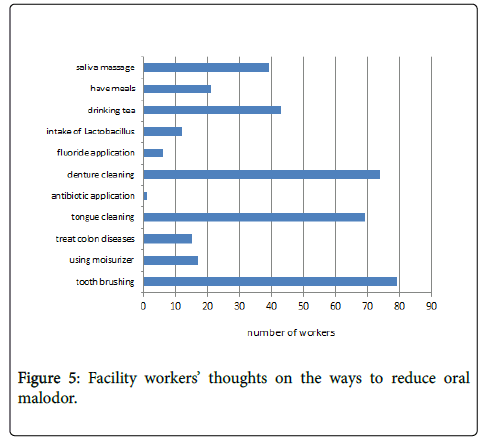Research Article Open Access
Consciousness and Knowledge of Nursing Home Workers About Oral Malodor
Ishii A1, Yoneda M2*, Suzuki N3, Haraga M4, Yamada K2, Morita H2, Hirahashi K4, Koga C4, Inoue Y1 and Hirofuji T2
1Department of Dental Hygiene, Fukuoka College of Health Science, Japan
2Section of General Dentistry, Department of General Dentistry, Fukuoka Dental College, Japan
3Section of Oral Public Health, Department of Preventive and Public Health, Fukuoka Dental College, Japan
4Center for Oral Diseases, Fukuoka Dental College, Japan
- *Corresponding Author:
- Masahiro Yoneda
Section of General Dentistry
Department of General Dentistry
Fukuoka Dental College, 2-15-1
Tamura, Sawara-ku, Fukuoka 814-0193, Japan
Tel.: +81-92-801-0411 (ext) 125
Fax: +81-92-801-4909
E-mail: yoneda@college.fdcnet.ac.jp
Received Date: October 03, 2016; Accepted Date: October 20, 2016; Published Date: October 28, 2016
Citation: Ishii A, Yoneda M, Suzuki N, Haraga M, Yamada K, et al. (2016) Consciousness and Knowledge of Nursing Home Workers About Oral Malodor . J Oral Hyg Health 4: 207. doi:10.4172/2332-0702.1000207
Copyright: © 2016 Ishii A, et al. This is an open-access article distributed under the terms of the Creative Commons Attribution License, which permits unrestricted use, distribution, and reproduction in any medium, provided the original author and source are credited.
Visit for more related articles at Journal of Oral Hygiene & Health
Abstract
An increasing number of elderly people in Japan are living in nursing homes. Some of them have strong breath odor, which makes it difficult for the facility workers to perform oral care service.
A questionnaire survey was conducted to examine how often the facility workers experience the residents’ oral malodor. The knowledge and consciousness of workers about oral malodor were also examined. Some workers actually experienced oral malodor of the facility residents and hoped that their breath odor could be reduced. The workers understood the causes of oral malodor, but the importance of saliva flow was not well recognized. On the other hand, more than 80% of workers expressed concern about their own breath odor while providing oral care. Nearly 80% of them want to get more information on oral malodor.
The results of this questionnaire survey showed that oral malodor is an important matter at care facilities for the elderly, and instruction on oral malodor is necessary for facility workers.
Keywords
Oral malodor; Nursing home; Oral care; Questionnaire survey
Introduction
Many people today are concerned about their breath odor, and there have been many surveys on this topic within the general population [1]. Yaegaki et al. conducted a questionnaire survey of young women in Japan, examining their behaviors and perceptions of oral malodor [2]; Al-Ansari et al. also examined self-reported halitosis in Kuwaiti patients [3].
An increasing number of elderly people in Japan are living in nursing homes. Workers in those facilities provide oral care to the elderly residents. Some nursing home staff members are known to have stress due to the dementia [4] and violence [5] of their residents. They may also have difficulties in conducting their job because of the strong breath odor of the oral care recipients. The workers may think that the breath odor needs to be reduced. No research efforts, however, have examined the elderly persons’ consciousness of their own oral malodor. We also do not know how much knowledge the workers have about breath odor control. A questionnaire survey was conducted to examine the consciousness of workers at facilities for the elderly. Their knowledge about breath odor was also examined.
Materials and Methods
The nursing home is located in Oita Prefecture of Japan. The number of residents is 150 and the number of workers is 96. We asked the workers to fill out the anonymous questionnaire sheet. Out of 96 workers, 82 returned complete answer sheets (ratio of valid response is 85.4%). This survey was approved by the facility’s ethics committee and written informed consent was obtained from the workers.
Results
Oral malodor of facility residents
About 68% of workers were females in their twenties to sixties (Figure 1). More than 77% of workers experienced oral malodor from facility residents, but only a limited number of those residents had strong oral malodor (Figure 2). About one third of workers felt stress in coping with the malodor of residents, and they hoped that the oral malodor could be decreased (Figure 3).
Knowledge about oral malodor
The workers’ knowledge about oral malodor was investigated. The workers knew that dental caries, uncleaned dentures, and periodontitis were major causes of oral malodor (Figure 4). However, stomach diseases were considered more important than dry mouth. Some respondents thought too much saliva flow causes oral malodor. Next, the survey asked respondents for their ideas to reduce oral malodor. They understood that denture cleaning, tongue scraping, and tooth brushing were effective in reducing oral malodor (Figure 5). However, fewer than half of the workers thought that preventing dry mouth—by methods such as massage of saliva glands, drinking tea, and use of oral moisturizer—were effective.
Consciousness of their own oral malodor
More than 80% of workers worried about their own breath odor when they provide oral care to their residents (Figure 6A). Nearly 80% of them want to receive information on oral malodor (Figure 6B).
Discussion
The effectiveness of oral care for preventing pneumonia was reported [6], and the importance of oral care for the elderly is increasing. Oral care is performed very close to the mouth, so the strong breath odor of elderly recipients may annoy oral care workers. Poor oral hygiene, periodontal disease, uncleaned dentures, dry mouth, and deep caries are the main causes of oral malodor [7], and these conditions are getting worse in elderly people. Dry mouth is considered particularly significant in producing oral malodor [8].
Many nursing home workers experienced the oral malodor, but the number of elderly persons who had strong oral malodor was limited. The oral malodor seemed not to be necessarily a common problem among the elderly, and only some elderly persons may have oral problems known to contribute to the condition. In this work, only the workers’ reports were obtained, so we need to measure breath odor and examine the oral conditions of the residents in the future. About one third of workers felt stress due to the residents’ oral malodor, and they hoped that the oral malodor could be decreased. For this purpose, it is necessary to understand the causes of oral malodor. The workers knew that tongue coating, unclean dentures, and periodontitis were major causes of oral malodor. However, they believed that stomach diseases were more important than dry mouth. Moreover, some of them thought too much saliva flow causes oral malodor. Saliva is important in reducing oral bacteria and oral malodor [8], and preventing dry mouth is considered to be effective in reducing breath odor, but the importance of moisturizing the oral cavity was not well recognized by the facility workers.
It is interesting that the workers also worry about their own breath odor in performing oral care service. They consider oral malodor to be annoying whether they are producing it or experiencing it during oral care. The results of this work showed a clear desire among facility workers for more information on oral malodor. It is important to give them the basic knowledge about this embarrassing condition and the ways to reduce it.
Acknowledgements
This study was in part supported by a Grant-in-Aid for Scientific Research (C) 16K11577 (M.Y.) and Grants-in-Aid for Advanced Science Research (M.Y., T.H.) from the Ministry of Education, Culture, Sports, Science, and Technology, Japan.
References
- Miyazaki H, Sakao S, Katoh Y, Takehara T (1995) Oral malodor in the general population of Japan. In Bad Breath: Research Perspectives, 2nd ed, Tel Aviv: Ramot Publishing – Tel Aviv University, pp. 119-136.
- Yaegaki K, Masui I, Sano S, Kitamura T (1995) Studies for behavior and perception toward oral malodour. Tsurumi Shigaku 21: 457-466.
- Al-Ansari JM, Boodai H, Al-Sumait N, Al-Khabbaz AK, Al-Shammari KF, et al. (2006) Factors associated with self-reported halitosis in Kuwaiti patients. J Dent 34: 444-449.
- Hirata H, Harvath TA (2016) Japanese care workers' perception of dementia-related physically and psychologically aggressive behaviour symptoms. Int J Older People Nurs.
- Gabrovec B, Eržen I (2016) Prevalence of violence towards nursing staff in Slovenian nursing homes. Zdr Varst 55: 212-217.
- Yoneyama T, Yoshida M, Matsui T, Sasaki H (1999) Oral care and pneumonia. Oral Care Working Group. Lancet 354: 515.
- Tonzetich J (1977) Production and origin of oral malodor: a review of mechanisms and methods of analysis. J Periodontol 48: 13-20.
- Koshimune S, Awano S, Gohara K, Kurihara E, Ansai T, et al. (2003) Low salivary flow and volatile sulfur compounds in mouth air. Oral Surg Oral Med Oral Pathol Oral Radiol Endod 96: 38-41.
Relevant Topics
- Advanced Bleeding Gums
- Advanced Receeding Gums
- Bleeding Gums
- Children’s Oral Health
- Coronal Fracture
- Dental Anestheia and Sedation
- Dental Plaque
- Dental Radiology
- Dentistry and Diabetes
- Fluoride Treatments
- Gum Cancer
- Gum Infection
- Occlusal Splint
- Oral and Maxillofacial Pathology
- Oral Hygiene
- Oral Hygiene Blogs
- Oral Hygiene Case Reports
- Oral Hygiene Practice
- Oral Leukoplakia
- Oral Microbiome
- Oral Rehydration
- Oral Surgery Special Issue
- Orthodontistry
- Periodontal Disease Management
- Periodontistry
- Root Canal Treatment
- Tele-Dentistry
Recommended Journals
Article Tools
Article Usage
- Total views: 4670
- [From(publication date):
November-2016 - Jul 12, 2025] - Breakdown by view type
- HTML page views : 3721
- PDF downloads : 949

